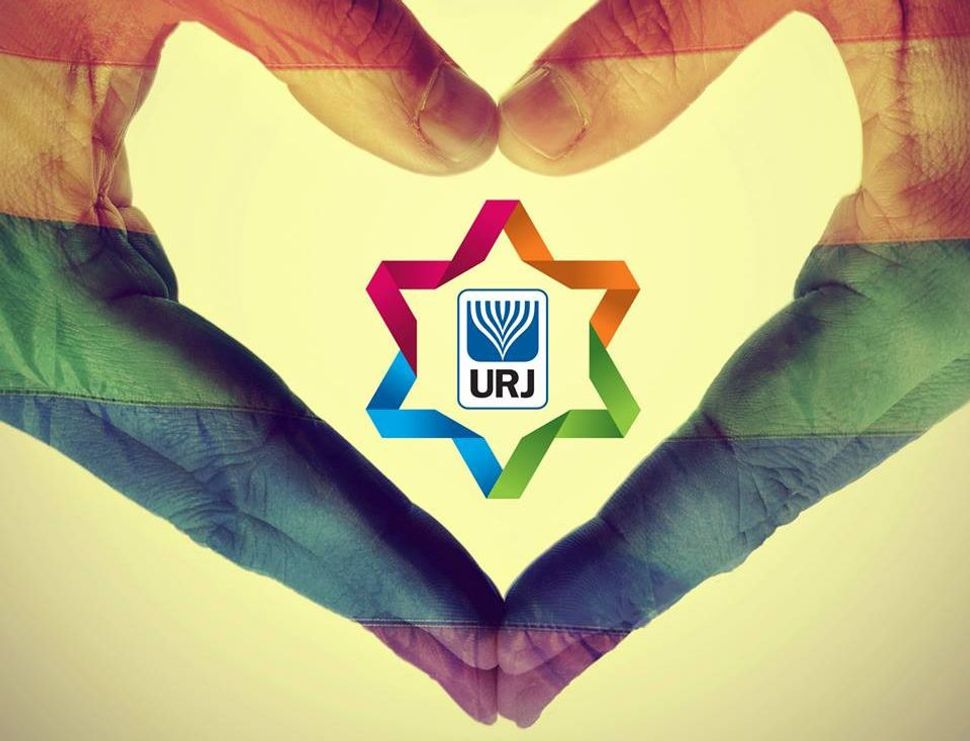Reform Passes Groundbreaking Transgender Resolution by Acclamation

Image by Union for Reform Judaism
Temples and synagogues affiliated with the nation’s largest Jewish movement should take specific steps to embrace transgender people, a U.S. conference of Reform Jews urged on Thursday in approving a groundbreaking resolution.
In a resounding voice vote, Reform Judaism embraced some of the most far-reaching policies for transgender men and women seen among any of the nation’s mainstream religious organizations, lesbian, gay, bisexual and transgender (LGBT) right advocates said.
The resolution calls for congregations to offer cultural training for religious school staff, sermons on transgender issues and gender-neutral restrooms where feasible.
The measure generated little discord among the 1.5 million North America Jews affiliated with the Union for Reform Judaism, which is holding a biennial conference in Orlando, Florida.
“We have gay, lesbian, the whole rainbow members and on our board of trustees,” said Ken Snitz from Temple Israel in Tulsa, Oklahoma. “We’re very open and supportive. We don’t just say it. We practice it.”
The Episcopal Church and United Church of Christ also have adopted positions in support of transgender issues. Yet the Reform Jewish movement’s policy goes further by listing specific actions to promote inclusion, said Michael Toumayan of the national Human Rights Campaign, which advocates for gay rights.
“It’s a big deal, but at the same time it’s not controversial for them at all,” he said.
It is Reform Judaism’s first anti-discrimination policy on transgender issues, said Barbara Weinstein, associate director of the Religious Action Center of Reform Judaism, a Washington-based advocacy center.
In 2003, the movement admitted its first openly transgender person to rabbinical school and in 2015 required congregations to consider all candidates for rabbinical jobs, regardless of gender identity, according to the resolution.
The measure also urges public policy changes to make it easier for transgender persons to update passports, voter registrations and birth certificates, and to be identified with pronouns and have access to public restrooms according to their gender identity.
Although many of the 900 affiliated Reform congregations already are welcoming to transgender persons, others will now address the issue for the first time, Weinstein said.
Some smaller religious institutions, such as the Unitarian Universalist Church and the Metropolitan Community Church, which organized as a Christian center for LGBT people, also have strong anti-discrimination policies, according to the Human Rights Campaign.—Reuters
A message from our Publisher & CEO Rachel Fishman Feddersen

I hope you appreciated this article. Before you go, I’d like to ask you to please support the Forward’s award-winning, nonprofit journalism so that we can be prepared for whatever news 2025 brings.
At a time when other newsrooms are closing or cutting back, the Forward has removed its paywall and invested additional resources to report on the ground from Israel and around the U.S. on the impact of the war, rising antisemitism and polarized discourse.
Readers like you make it all possible. Support our work by becoming a Forward Member and connect with our journalism and your community.
— Rachel Fishman Feddersen, Publisher and CEO


























